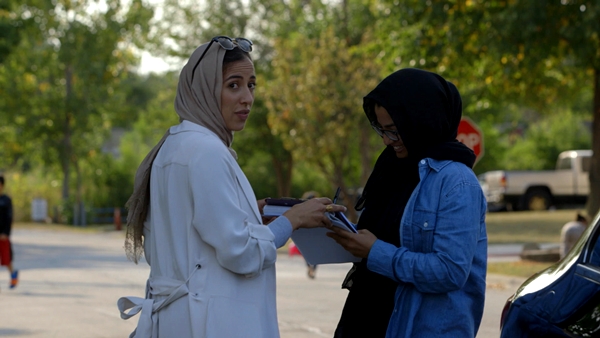
Residents of Bridgeview, IL, urging neighbors to sign privacy waivers in The Feeling of Being Watched, (Watched Film, LLC)
![]() Both highly personal as well as thoroughly engrossing, director Assia Boundaoui’s documentary centers on a community that exists somewhere between paranoia and reality. More specifically, it takes place in Bridgeview, a Chicago suburb of roughly 200 families, the vast majority of whom are Muslim. Having lived there all of her life, Boundaoui can remember strange incidents from childhood, such as men working on the telephone poles outside of her home late at night. Her mother claimed they were FBI agents, but were they really?
Both highly personal as well as thoroughly engrossing, director Assia Boundaoui’s documentary centers on a community that exists somewhere between paranoia and reality. More specifically, it takes place in Bridgeview, a Chicago suburb of roughly 200 families, the vast majority of whom are Muslim. Having lived there all of her life, Boundaoui can remember strange incidents from childhood, such as men working on the telephone poles outside of her home late at night. Her mother claimed they were FBI agents, but were they really?
The director also recalls hearing how the parents of childhood friends were accused of financing terrorism and how, even after they were exonerated, the FBI harassed them until they fled America. A mother herself now, she worries that the same thing could eventually happen to her family, and so as a journalist, she looks into whether the agency is currently investigating her or her loved ones. Soon she’s uncovered Operation Vulgar Betrayal, through which every mosque in the country went under surveillance during the 1990s—and all their attendees became the subjects of their own FBI files.
Apparently, to live in Bridgeview means getting used to government agents tracking your every move, as many residents, including Boundaoui’s mother, have tales to share about strange men knocking on their doors, flashing a badge, and wanting to ask questions about relatives or neighbors. But the extent to which paranoia runs through the community becomes especially clear after Boundaoui submits a request for her FBI file through the Freedom of Information Act. Odd things start to happen, including but not limited to an ex-law-enforcement figure with deep ties to Vulgar Betrayal personally reaching out to her.
A recurring theme is how dangerous it is to live in a state in which one cannot be sure what is real versus a delusion. That’s especially true for an entire community, as even minor incidents, such as a new speed bump in front of Boundaoui’s home, send her mind spinning. Meanwhile, when a larger event takes place—an unexplained procession of police and military vehicles—conspiracy theories abound, and everyone is left feeling on edge. The film argues that the filmmaker might as well be stuck in her own head, since everyone in her support network is also in a state of heightened alert, resulting in an echo chamber of ever-increasing anxiety.
Boundaoui, making her feature debut, shapes her material to emphasize suspense. Along with utilizing a moody synth score to create an ominous atmosphere, there are lots of voyeuristic, overhead establishing shots, which simulate Big Brother watching the community from a distance. Even when the camera follows her, it is sometimes positioned like a detached observer, standing just far enough away so as not to be seen by those it is watching.
The film is certainly riveting based solely on its premise, but thanks to having a lifelong member of the Bridgeview community at its center, viewers get a glimpse of day-to-day life. The result is a complex, multifaceted portrait in which no attempt is made to hide the subjects’ Muslim faith or ethnicity. One sequence involves Boundaoui and her girlfriends celebrating a birthday at a roller-skating rink, and they resemble any other group of fun-loving young women—they all just happen to be wearing hajibs and other traditional dress. However, when it comes to intra-community politics, we witness the tension between the younger generation and their elders, as the former wants to fight back against the trampling of the community’s civil rights, while some of the latter fear what might happen if they speak out.
Interestingly, Boundaoui is not the most militant rabble-rouser, and the film delves into the reasons why that is, which tie into the psychology of constantly feeling like an outsider. Early on, she discusses how she’s always been self-conscious of how non-Arabs look at her; that is, with a combination of fear and suspicion. As a result, she constantly wants to be accepted and liked by others, even by those who try and demean or intimidate her. This adds another layer of suspense as we are constantly wondering if she can accomplish her end goal, given her aversion to confrontation.
Ultimately, the film is less about Boundaoui taking on xenophobic boogeymen than what her larger community opts to do to reassert its civil rights, and so much of what is triumphant about the ending centers on the masses coming together. The Feeling of Being Watched takes place both before and after the 2016 presidential election, and the rise to power of Donald Trump certainly casts an ominous shadow over the second half. However, the actions of Boundaoui and her neighbors send a powerful, reassuring message, a reminder that we can hold the powers that be accountable, and that panic isn’t our only option.






Leave A Comment